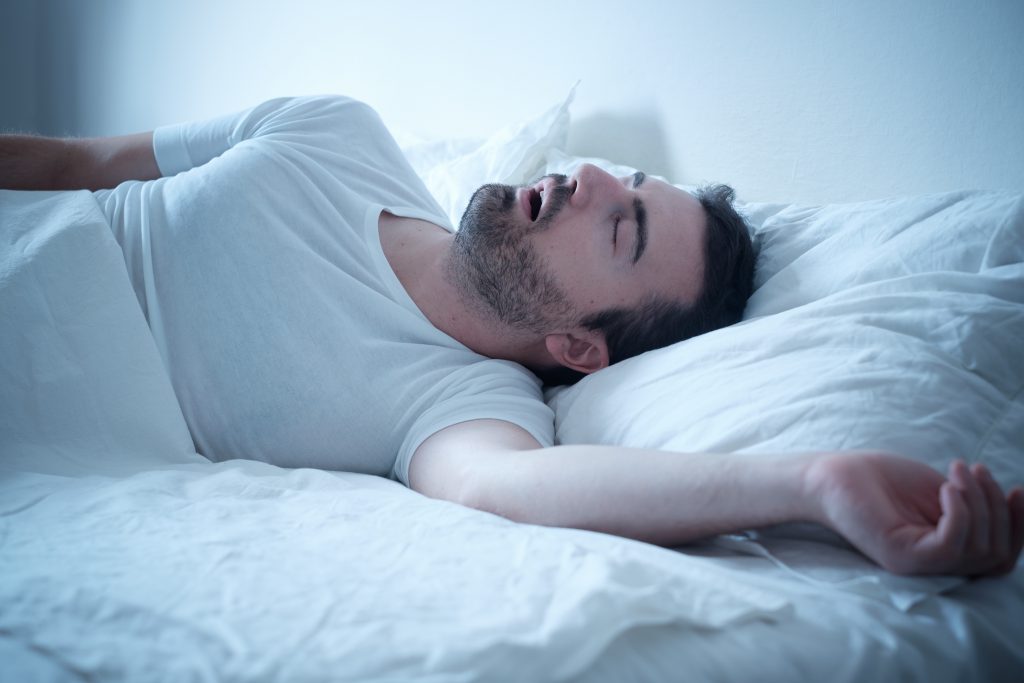What Is Sleep Apnea?
Do you snore loudly? Do you feel tired when you wake up, even though you went to bed early? Do you occasionally wake up at night with a gasp? You may have a common sleep disorder that affects about 18 million adults in the United States. Sleep apnea can interfere with the quality of your sleep, disrupt your relationship with a partner, interrupt work, and increase your risk for heart attacks, early death, and car accidents.

Here’s what you should know about this common sleep disorder, including how you can start your sleep apnea treatment.
What Is Sleep Apnea?
Sleep apnea is a very common sleep disorder that causes breathing to become interrupted briefly but frequently during sleep. Each apnea episode lasts at least 10 seconds when breathing stops completely.
There are three types of the disorder: obstructive, central, and mixed. It is conservatively estimated that Obstructive Sleep Apnea, (OSA), affects about 4% of men and 2% of women, although it’s estimated that just 1 in 10 people who are diagnosed with OSA seek medical care. This form of sleep disorder is caused by blockage of the airways during sleep when your throat relaxes and allows your tongue or tissue of your throat to fall back and reduce airflow.
The central form of this sleep disorder, or CSA, happens when the brain does not signal to the muscles responsible for breathing during sleep. This form is less common than OSA. A third form of the disorder is called mixed or complex because it combines central and obstructive symptoms.
Signs You Have a Sleep Disorder
There are many signs you may have a sleep disorder, some more obvious than others. You may have OSA or CSA, or a mixture of the two if you experience the following:
- You snore very loudly. Not everyone who snores has a sleep disorder, but it is a classic sign of the condition. Snoring punctuated by moments of silence is an especially clear sign of sleep apnea.
- Beware! Not everyone who has sleep apnea snores! Stoppage of breath is oftentimes completely silent!
- You wake up with a dry or sore throat.
- You sometimes wake up gasping or choking.
- A partner witnesses episodes in which you stop breathing during sleep. This usually lasts about 10 seconds and you may startle when breathing resumes.
- You have headaches in the morning.
- You feel very sleepy while driving.
- You have chronic fatigue or low energy.
- You wake up frequently at night, even just to use the bathroom, or have insomnia.
- You wake up feeling tired.
- You notice mood changes, forgetfulness, or reduced libido.
What Causes Sleep Disorders?
All three forms of this sleep disorder can be caused by many factors. In adults, excess weight is the most common cause of OSA, but it may be caused at least in part by anatomical features like a thick neck, small jaws, or narrow throat. In children, it can be caused by enlarged tonsils and dental conditions like an overbite. CSA is also associated with being overweight, but it may be caused by certain medications, heart failure, and conditions that affect the brain stem as well.
Men are up to twice as likely to develop a sleep disorder than women, and as you age it can increase your risk of developing OSA or CSA. Other risk factors associated with serious sleep disorders include:
- Smoking
- Heart disorders
- Stroke
- Opioid medications
- Frequent alcohol consumption
- Family history
How Is it Diagnosed?
Sleep disorders are usually diagnosed with a sleep study or polysomnogram. This will require spending the night at a sleep center. Your dentist or primary care physician may refer you to a sleep clinic if you suspect a sleep disorder.
During the sleep study, your eye movement, sleep state, respiration, airflow, heart rate, muscle activity, and blood oxygen levels will be monitored and used to diagnose you. This will be done through surface electrodes on your scalp and face that monitor electrical signals generated by your brain and muscles. You will also have a belt around your chest to measure breathing and an oximeter probe on your finger to monitor blood oxygen levels.
Treatment Options
A sleep disorder can cause more harm than snoring and poor sleep quality; it can also increase your risk of heart disease, accidents, and death. Once diagnosed, it’s important to have the disorder treated effectively to help you get a full night of quality sleep.
There are several options to treat sleep apnea. For very mild cases, lifestyle changes can be effective. This includes losing weight, quitting smoking, and avoiding alcohol. Sleeping on your side can also help keep your airway open.
For OSA, positive airway pressure (PAP) therapy is the most common. This usually involves a BiPAP or CPAP machine with a mask you wear at night. A CPAP machine blows air gently and continuously into your airway to keep it open while you are asleep. A BiPAP machine is similar but it changes airflow when you breathe in and out.
Oral appliances like a tongue-retaining mouthpiece or a mandibular advancement device (MAD) can also treat obstructive sleep apnea. These dental appliances work by repositioning the lower jaw and tongue to clear the airway during sleep. These dental devices are designed by dentists who specialize in treating sleep disorders.
In extreme cases, surgery may be necessary. There are a few types of surgery that may be warranted such as nasal surgery to correct a deviated septum, removal of soft tissue at the back of the throat that obstructs the airway, and surgery on the jaw to correct issues that contribute to sleep apnea.
Are you concerned that you may have OSA? At 5 Points Advanced Dentistry, we can help. While a dentist cannot diagnose a sleep disorder, your dentist can help treat your condition and refer you to a medical professional that can diagnose you. We screen patients at our Upper Arlington office for sleep disorders, and if this screening indicates you may have sleep apnea, we can refer you to a sleep doctor for a formal sleep evaluation and testing. From there, we can help treat your condition with a special dental appliance that keeps your airway open while you sleep.
Don’t ignore the signs of sleep apnea; it can negatively affect your life in a variety of ways. If you suspect you have a sleep disorder, contact our office today for a screening and referral.

